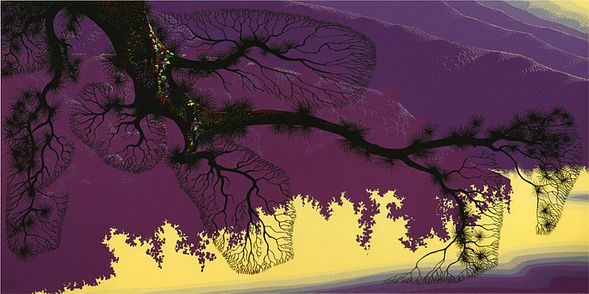
Eyvind Earle Limited Edition, Serigraph on Paper: "Purple Coastline"

Artist: Eyvind Earle
Title: Purple Coastline (1996)
Image Dimensions: 20" x 40"
Edition: 200 Singed and Numbered, 20 AP, 5 PP, 5 HC, 2 Working Proofs
Medium: Limited Edition, Serigraph on Paper
About The Artist : Born in New York in 1916, Eyvind Earle began his prolific career at the age of ten when his father, Ferdinand Earle, gave him a challenging choice: read 50 pages of a book or paint a picture every day. Earle choose both. From the time of his first one-man showing in France when he was 14, Earle's fame had grown steadily. At the age of 21, Earle bicycled across country from Hollywood to New York, paying his way by painting 42 watercolors. In 1937, he opened at the Charles Morgan Galleries, his first of many one-man shows in New York. Two years later at his third consecutive showing at the gallery, the response to his work was so positive that the exhibition sold out and the Metropolitan Museum of Art purchased one of his paintings for their permanent collection. His earliest work was strictly realistic, but after having studied the work of a variety of masters such as Van Gogh, Cézanne, Rockwell, Kent and Georgia O'Keefe, Earle by the age of 21, came into his own unique style. His oeuvre is characterized by a simplicity, directness and surety of handling.
In 1951 Earle joined Walt Disney studios as an assistant background painter. Earle intrigued Disney in 1953 when he created the look of "Toot, Whistle, Plunk and Boom" an animated short that won an Academy Award and a Cannes Film Festival Award. Disney kept the artist busy for the rest of decade, painting the settings for such stories as "Peter Pan", "For Whom the Bulls Toil", "Working for Peanuts", "Pigs is Pigs", "Paul Bunyan" and "Lady and the Tramp". Earle was responsible for the styling, background and colors for the highly acclaimed movie "Sleeping Beauty" and gave the movie its magical, medieval look. He also painted the dioramas for Sleeping Beauty's Castle at Disneyland in Anaheim, California.
Earle's work was also seen on television. One of his animated creations was an 18-minute version of the story of the Nativity that he did in 1963 for Tennessee Ernie Ford's Special "The Story of Christmas". A Daily Variety reviewer said Earle's sequence "should be preserved and played back for years on end." The show was digitally re-mastered in 1997.
Earle's career has encompassed many different fields. In addition to book illustrating, the artist had also designed a number of covers for magazine publications and had produced and created several animated commercials and specials for television.
In 1998, at its Annie Awards show in Glendale, the International Animated Film Society gave Earle its Windsor McCay Award for lifetime achievement. In the 1940's, Earle adapted his creative landscapes to Christmas cards, painting more than 800 designs that have sold more than 300 million copies through American Artist Group.
After about 15 years creating animated art, Earle returned to painting full time in 1966 and kept working until the end of his life. In addition to his watercolors, oils, sculptures, drawings and scratchboards, in 1974 he began making limited edition serigraphs. Eyvind Earle had a totally original perception of landscape. He successfully synthesizes seemingly incongruent aspects into a singularly distinctive style: a style, which is at once mysterious, primitive, disciplined, moody and nostalgic. He captures the grandeur of simplicity of the American countryside, and represents these glimpses of the American scene with a direct lyric ardor. His landscapes are remarkable for their suggestion of distances, landmasses and weather moods. "For 70 years," Earle wrote in 1996, "I've painted paintings, and I'm constantly and everlastingly overwhelmed at the stupendous infinity of Nature. Wherever I turn and look, there I see creation. Art is creating...Art is the search for truth."
Eyvind Earle passed away on July 20, 2000 at the age of 84. During his lifetime he created many paintings, sculptures, scratchboards, watercolors and drawings that have not been publicly seen or exhibited. Eyvind Earle Publishing LLC, under the specific instruction of the late Eyvind Earle, will continue the legacy of the artist, promoting and introducing new serigraphs and books through galleries worldwide. These posthumous limited edition serigraphs will be printed from the oil paintings created by Eyvind Earle that are in the collection of Joan Earle and others.
Title: Purple Coastline (1996)
Image Dimensions: 20" x 40"
Edition: 200 Singed and Numbered, 20 AP, 5 PP, 5 HC, 2 Working Proofs
Medium: Limited Edition, Serigraph on Paper
About The Artist : Born in New York in 1916, Eyvind Earle began his prolific career at the age of ten when his father, Ferdinand Earle, gave him a challenging choice: read 50 pages of a book or paint a picture every day. Earle choose both. From the time of his first one-man showing in France when he was 14, Earle's fame had grown steadily. At the age of 21, Earle bicycled across country from Hollywood to New York, paying his way by painting 42 watercolors. In 1937, he opened at the Charles Morgan Galleries, his first of many one-man shows in New York. Two years later at his third consecutive showing at the gallery, the response to his work was so positive that the exhibition sold out and the Metropolitan Museum of Art purchased one of his paintings for their permanent collection. His earliest work was strictly realistic, but after having studied the work of a variety of masters such as Van Gogh, Cézanne, Rockwell, Kent and Georgia O'Keefe, Earle by the age of 21, came into his own unique style. His oeuvre is characterized by a simplicity, directness and surety of handling.
In 1951 Earle joined Walt Disney studios as an assistant background painter. Earle intrigued Disney in 1953 when he created the look of "Toot, Whistle, Plunk and Boom" an animated short that won an Academy Award and a Cannes Film Festival Award. Disney kept the artist busy for the rest of decade, painting the settings for such stories as "Peter Pan", "For Whom the Bulls Toil", "Working for Peanuts", "Pigs is Pigs", "Paul Bunyan" and "Lady and the Tramp". Earle was responsible for the styling, background and colors for the highly acclaimed movie "Sleeping Beauty" and gave the movie its magical, medieval look. He also painted the dioramas for Sleeping Beauty's Castle at Disneyland in Anaheim, California.
Earle's work was also seen on television. One of his animated creations was an 18-minute version of the story of the Nativity that he did in 1963 for Tennessee Ernie Ford's Special "The Story of Christmas". A Daily Variety reviewer said Earle's sequence "should be preserved and played back for years on end." The show was digitally re-mastered in 1997.
Earle's career has encompassed many different fields. In addition to book illustrating, the artist had also designed a number of covers for magazine publications and had produced and created several animated commercials and specials for television.
In 1998, at its Annie Awards show in Glendale, the International Animated Film Society gave Earle its Windsor McCay Award for lifetime achievement. In the 1940's, Earle adapted his creative landscapes to Christmas cards, painting more than 800 designs that have sold more than 300 million copies through American Artist Group.
After about 15 years creating animated art, Earle returned to painting full time in 1966 and kept working until the end of his life. In addition to his watercolors, oils, sculptures, drawings and scratchboards, in 1974 he began making limited edition serigraphs. Eyvind Earle had a totally original perception of landscape. He successfully synthesizes seemingly incongruent aspects into a singularly distinctive style: a style, which is at once mysterious, primitive, disciplined, moody and nostalgic. He captures the grandeur of simplicity of the American countryside, and represents these glimpses of the American scene with a direct lyric ardor. His landscapes are remarkable for their suggestion of distances, landmasses and weather moods. "For 70 years," Earle wrote in 1996, "I've painted paintings, and I'm constantly and everlastingly overwhelmed at the stupendous infinity of Nature. Wherever I turn and look, there I see creation. Art is creating...Art is the search for truth."
Eyvind Earle passed away on July 20, 2000 at the age of 84. During his lifetime he created many paintings, sculptures, scratchboards, watercolors and drawings that have not been publicly seen or exhibited. Eyvind Earle Publishing LLC, under the specific instruction of the late Eyvind Earle, will continue the legacy of the artist, promoting and introducing new serigraphs and books through galleries worldwide. These posthumous limited edition serigraphs will be printed from the oil paintings created by Eyvind Earle that are in the collection of Joan Earle and others.












